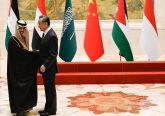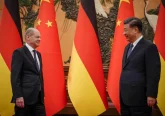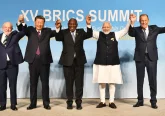
Bestselling author, financial economist (and Oxford alumnus) Dambisa Moyo argues in her new book that the rise of China is generating unanticipated consequences for the international system and that no one — bar the Chinese Communist Party — is actively thinking about how to handle the long term fallout of these seismic shifts. I debated some of these ideas with her on Radio 4’s Today Programme a couple of days ago.
One of Moyo’s controversial arguments is that China’s ascendency doesn’t just put tremendous pressure on commodity markets, but is likely to represent such a big demand shock that supply of key resources simply can’t keep up. The consequence, for Moyo, is then that as countries — and the planet as a whole — run out of resources, this will trigger violent conflict (e.g. “Water Wars”) between different states and communities within states in an attempt to maintain their commodity entitlements. Moyo was thus uncriticically regurgitating the old Malthusian argument about “tragedies of the commons” occurring, mostly in developing countries, with population growth and environmental factors as the cause of growing poverty and civil strife.
Yet there is a strong and deep academic literature, that draws on extensive interdisciplinary evidence from economics, political science, anthropology and history, which shows how simplistic and misguided such arguments about “resource wars” are, both when approached theoretically and through Asian or African case studies. Both historically and contemporarirly, growing resource scarcity does not tend to lead to conflict but to cooperation, even (or perhaps especially) in regions like the Middle East and the Horn of Africa. Moreover, the idea that wars are caused by exogenous environmental triggers — as opposed to endogenous political-economic drivers — has always been very convenient for powerful groups who try to depolicitise asymmetries in power and wealth and argue that scarcity is not man-made but really an Act of God that we can’t or shouldn’t contest.
Moyo is similarly simplistic about China, presenting the country as a largely monolithic actor that thinks with one mind and has one purpose. In her latest book, Winner Takes All, there is little discussion of the intense rivalry between different factions within the Chinese Communist Party and the impact this has on foreign and economic policy; there was also little discussion of other key faultlines — federal government vs. regional players, state-owned enteprises competing among themselves, as well as against purely private actors — that explain why it is unhelpful to generalise and see everything through a “One China” lens. Such broad brushstrokes overstate the degree of coherence in Chinese policy, particularly vis-à-vis Africa, and offer little in terms of opportunities for policy engagement with different Chinese actors.
For those looking for more nuance, detail and depth in analysing the changing position of China and Africa in the international system, I recommend visiting the website of the Oxford University China-Africa Network, which I convene and is currently hosting a series of debates between African public intellectuals on what Chinese investment means for local economic conditions from Mauritania to South Africa.
Harry Verhoeven is a lecturer in the Department of Politics and International Relations, Oxford University.








No Comment